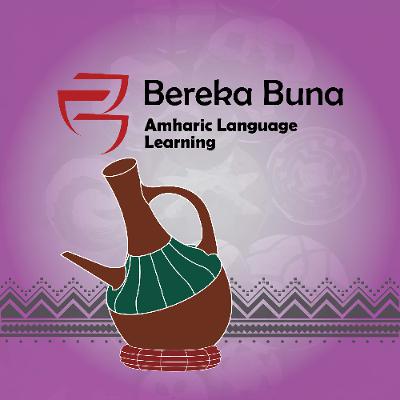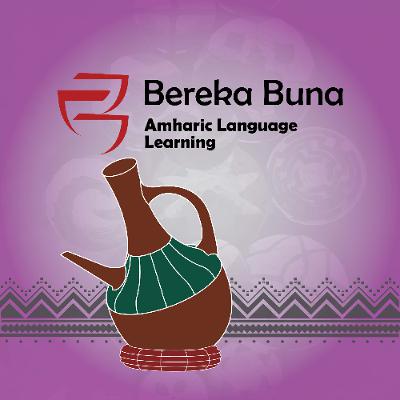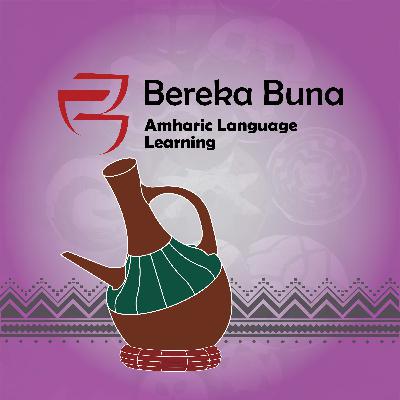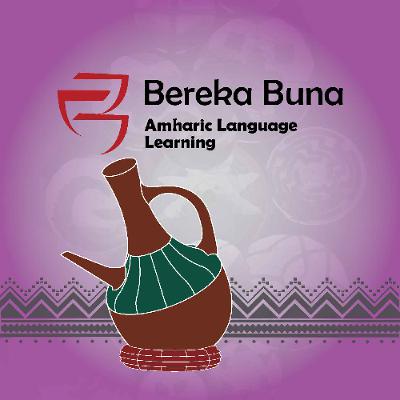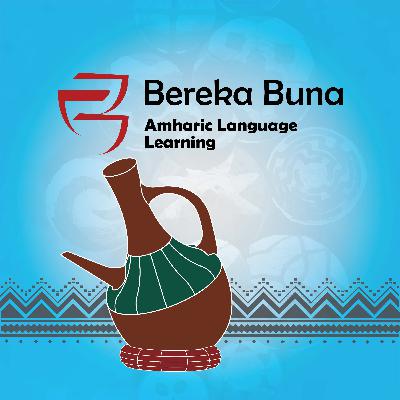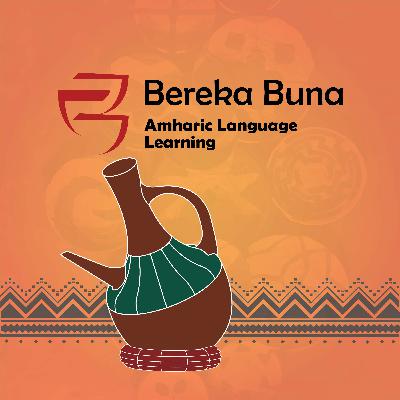Discover Bereka Buna
Bereka Buna

Bereka Buna
Author: Bereka Buna
Subscribed: 12Played: 119Subscribe
Share
© All rights reserved
Description
Welcome to Bereka Buna, a podcast series designed to support Amharic Language Learning. Episodes in the series range from a focus on vocabulary and grammar to dialogue and more conversational Amharic to get you started on learning the language and move you beyond the basics. Follow along with full transcripts (transliterated and in Amharic Fidel) to hone your reading and writing skills as you listen. The course is meant as support for learning you may already be embarking on. Join host, Luana DeBorst, and guest speakers on this journey of language learning and exploration! For more visit berekabuna.org. Accompanying videos can be found on YouTube @BerekaBuna.
38 Episodes
Reverse
We’re back this episode with an in-depth look at one of the words that makes Amharic so dynamic, and so hopelessly confusing at times: that is, the verb አለ. Today we’ll look at compounds of the verb አለ, which can be used in a variety of ways to create meaning. If you need a refresher, I would recommend going back to episode 5 of Season 3 to touch up on some of the other conjugations and variations of አለ. Pull up the transcript and follow along as we run through conjugations, application and practice sentences.
Today we’re lucky to be back with another episode in our Stories Series with the fabulous Selamawit Geleta. If you’re interested in taking Amharic classes, please visit our website at berekabuna.org. As with the last two story series episodes, you’ll find the picture book images and a list of vocabulary in the transcript at our website. I’d recommend following along to test your comprehension and learn new vocabulary. For more on this teaching technique see Greg Thompson’s Growing Participator Approach (GPA).
For this Story Series episode we give grammar a break to join Selam as she narrates a new wordless picture book. Follow along with the story images, vocabulary list and example sentences in the transcript. If you’ve enjoyed these stories and would like to find out more about taking classes in Addis Ababa or online, please visit us at berekabuna.org. For more on this teaching technique see Greg Thompson’s Growing Participator Approach (GPA).
Today we’ll continue on from where we left off last episode with a look at more complex aspects of the Passive form, including how to conjugate passive verbs in the Simple Past to other tenses, including the Present/Future, the Contingent, the Gerund, the Imperative, and more. If you are at the early stages of Amharic learning, we recommend going back to previous episodes where each tense is explained more in depth before continuing with this episode on how to conjugate the Passive form. It may also be helpful to pull up the transcript to follow along with conjugations for this episode and better identify subtle differences in the Fidel and pronunciation of the active and passive forms.
This episode introduces a complex element of Amharic grammar: The Passive Form. An active sentence in English might be “She painted the house”. A similar sentence in its passive form might be “the house was painted”. In this episode we look at how to construct passive sentences starting with verbs in the simple past perfect. I’d recommend pulling up the transcript to follow along with this episode.
In this episode we take a deep dive into an element of Amharic grammar known as The Causative. The Causative, as the name implies, refers to actions which wouldn’t happen of their own accord and so must be caused to occur. Amharic has both Direct and Indirect causative verbs. In this episode we look at both, running through some simple examples of causative verbs, and then deconstructing when and how these forms is used and rounding off with many more examples and practice sentences.
Welcome back to a new Season of Bereka Buna! This episode kicks off the Season with a look at Adjectives and how to use them in a sentence. We run through several examples of adjectives and numerals and then look at the grammatical rules to bear in mind when using adjectives in Amharic, closing out with our usual list of practice sentences.
Welcome to the final episode of Season 3 of Bereka Buna, where we’ll do our recap and practice for everything we’ve gone over this season. As always, you’ll hear the activity followed by the answer. If you’d like to use this as a test of your knowledge, make sure to pause before the answer is given and then check your answer. Also remember you can always open up the transcript to see the Amharic Fidel and review more by visiting berekabuna.org. መልካም እድል እና እስከ የሚቀጥለው ጊዜ, ሰላም ሁኑ!
In this week’s episode we’ll give grammar and technicalities a break to have a look at some of the unique phrases or expressions in Amharic that have no translation in English, and which give the language so much character. While I learned some of these just by listening and understanding context, many were actually new to me when I started this episode. Now that I know them, though, I can’t stop hearing them used everywhere. I hope this episode helps make you feel more at home with colloquial Amharic.
Today we’ll look at how to construct compound sentences using a verb form called The Gerund. We introduced the Gerund and how it is used to make past perfect conjugations in Episode 6 of Season 2, so if you’re struggling with this episode, I’d recommend going back for a recap. Now we’re going to go a step further and look at how the gerund is used in conjunction with other verbs to build compound sentences in which more than one action is taking place.
In this episode we pick up again with the second half of Ato Andreas’s story, narrated by the wonderful Selamawit Geleta. As always, if you enjoy her teaching style, you can connect by visiting our website, berekabuna.org. As with the last episode, you can find the illustrated story, as well as comprehension questions, suggested activities and a list of vocabulary in the transcript. If you would like to comment on the story series or other aspects of the podcast, please send us an email. The address is contact@berekabuna.org. In the meantime, enjoy!
Today we’re lucky to be back with another episode in our Stories Series with the fabulous Selamawit Geleta. If you’re interested in taking Amharic classes, please visit our website at berekabuna.org. As with the last two story series episodes, you’ll find the picture book images and a list of vocabulary in the transcript at our website. I’d recommend following along to test your comprehension and learn new vocabulary.
In this episode we’ll look at some of the most often used, but also most complex, verbs in the Amharic language. That is, uses of the verb አለ “Ale”. If you’ve made it this far in your language learning you’re likely to have come across the following verbs fairly regularly: አለ, አለው, አለሁ, አልኩ, አለኝ, etc. These variations on አለ are often written and even sound almost exactly the same, but they have different meanings and origins. This episode is designed to help you Identify them from one another and know which to use in any given context. The episode ends with an “appendix” wherein full verb conjugations are found. As always, the full conjugations can be found in the episode transcript.
In this week’s episode we’ll look at the Imperative and the Jussive, which are related forms of command or request. The Imperative is the name given to a direct command: i.e. go, come, listen, stop, etc. The Jussive can be thought of as an indirect command, more along the lines of “let him eat”, “let her take”, etc. It is often phrased as a question or request: “shall we?”, “may I?”, “could you?”, etc. In Amharic, as with all verb conjugations, these command forms vary according to the person being addressed.
Today we’ll continue from where we left off last week with our object modifiers, this time adding two important preposition that can completely change the meaning of the object-modified verb. These are the prepositions ለ and በ, the addition of which adds a layer of differing meaning to the word. In this episode, travel through full verb conjugation examples followed by sample sentences for practice.
In this episode we’ll get into some challenging but very important elements of the Amharic language. That is, how to incorporate the person who is doing the action (the subject) and the person who is receiving the action, or whom the action is being done upon (the object) in a sentence. Learning this means that we can build and understand more complex and specific sentences. Due to the complexity of these conjugations, I highly recommend following along with the episode transcript (link in the show bio).
Welcome back to another Season of Bereka Buna. In these next ten episodes we’ll continue to solidify your language and cultural learning by expanding on your vocabulary, knowledge of grammar, and familiarity with spoken and narrative Amharic. As with previous seasons you will have practice exercises, dialogue, and stories to help you deep-dive into the language. Let’s kick off the season by looking at some elements of Amharic culture and language that are quite unique to Ethiopia: the telling of time, the Ethiopian Calendar and holidays.
This episode reviews material covered in the second Season of Bereka Buna, using extensive practice activities to refresh your knowledge of elements covered so far, get you practicing, and test your comprehension. View the transcript at berekabuna.org for the practice activities, including amharic fidel.
For this Story Series episode, we are lucky to be joined again by Selamawit Geleta as she narrates a wordless picture book in Amharic. Follow along with the transcript (linked in the show bio) to see the illustrations and a list of new vocabulary.
In this first Episode of our Story Series we are joined by the wonderful Selamawit Geleta whose animated narration of a wordless picture book provides learners with new vocabulary, and a practical journey through sentence construction in Amharic. Follow along with the illustrations and full list of vocabulary in the transcript.


